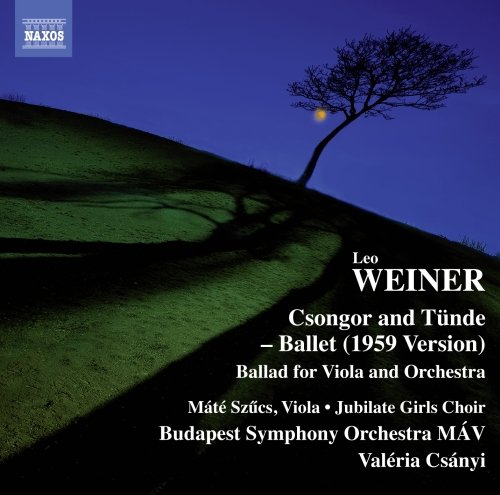WEINER Csongor and Tünde. Ballet
View record and artist detailsRecord and Artist Details
Composer or Director: Leó Weiner
Genre:
Orchestral
Label: Naxos
Magazine Review Date: 04/2016
Media Format: CD or Download
Media Runtime: 66
Mastering:
DDD
Catalogue Number: 8 573491

Tracks:
| Composition | Artist Credit |
|---|---|
| Csongor and Tünde |
Leó Weiner, Composer
Budapest Symphony Orchestra Jubilate Girls Choir Leó Weiner, Composer Valéria Csányi, Conductor |
| Ballad for Clarinet and Orchestra |
Leó Weiner, Composer
Budapest Symphony Orchestra Leó Weiner, Composer Màtè Szücs, Viola Valéria Csányi, Conductor |
Author: Rob Cowan
The incidental music to Csongor and Tünde, based on a dramatic poem by the 19th-century writer Mihály Vörösmarty, started out as a 22-movement piece but was compressed to a nine-movement ballet; when the ballet was revived after the Second World War (by which time the Jewish Weiner was back in favour) it grew again, this time to 14 movements, which is what we have hear. There’s a shorter sequence on Hungaroton played by the North Hungarian Symphony Orchestra under László Kovács but, good though that is, I think this version by the Budapest Symphony Orchestra is finer, not only because there’s so much more music on offer, but because conductor Valéria Csányi shapes the score as if she really loves it, right from the opening movement, ‘Prince Csongor and Mirigy the Witch’, and in the third, ‘Fairy’s Dance and Mirigy’, with its highly imaginative woodwind-writing. Think in terms of Glazunov’s The Seasons transferred to Hungarian soil. There’s much else in the score that is memorably dramatic: ‘The Witch and the Temptress’, or the ‘Witches’ Sabbath’ for example (the latter with very effective brass and tam-tam); then again, for contrast, the gentle barcarolle ‘Tünde triumphs over evil’.
One could quote many possible influences or parallels: in terms of Weiner’s compatriots, Bartók of The Wooden Prince or perhaps Dohnányi; and beyond Hungary, Richard Strauss, even Roussel. It’s a style that’s ideal for conjuring up magic or fairy-tale fantasy, which is what this is. The disc’s opening selection, a viola version of a Ballad for clarinet and orchestra, beautifully played by Máté Szu˝cs, blithely rhapsodises in the manner of the Eastern Romantics. All in all, a pleasurable experience, well recorded.
Explore the world’s largest classical music catalogue on Apple Music Classical.
Included with an Apple Music subscription. Download now.

Gramophone Digital Club
- Digital Edition
- Digital Archive
- Reviews Database
- Events & Offers
From £9.20 / month
Subscribe
Gramophone Club
- Print Edition
- Digital Edition
- Digital Archive
- Reviews Database
- Events & Offers
From £11.45 / month
Subscribe
If you are a library, university or other organisation that would be interested in an institutional subscription to Gramophone please click here for further information.






